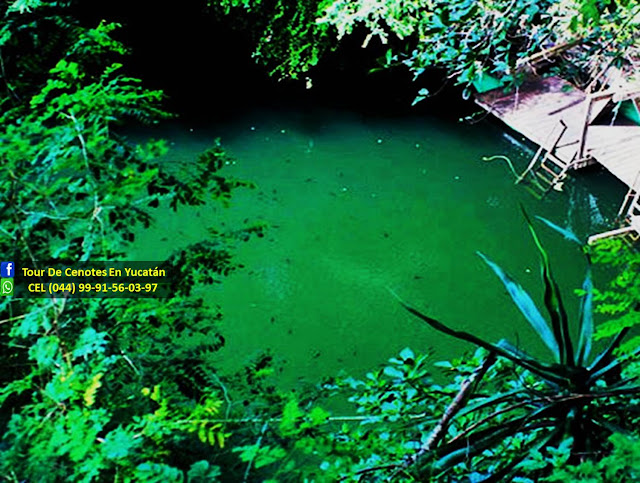While cenotes date back to the formation of the earth or the impact of a meteorite 65 million years ago, when a path is cleared to a cenote, gardens are cleaned up and safety measures are taken, it is said that there is a new cenote. The new cenote on the block, or better said, the newest cenote to be prepared for visitors, is Cenote Yokdzonot, located 18 kilometers (11 miles) west of Pisté/Chichén Itzá. A swim in this cenote is a magical experience. Small fish dart all around you, birds are swooping overhead and singing, and dragonflies flutter above the water’s surface. The water is cool and clean. The endeavor to work on this cenote began in 2005 when the people of the village of Yokdzonot (population 750) realized they needed to find new ways to make a living, as working in the fields and being farmers was not enough to make ends meet. Being so close to Chichén Itzá and also seeing that other cenotes have been cleaned up, manicured and opened to visitors, gave them the idea to do the same with the cenote in their village. Sixty Mayan women and men got together at a village assembly and very intelligently went about forming a co-op and getting a 50 year concession on the cenote and the land around it. They then went about getting help and information from an architect to help build the bathrooms, kitchen, palapa restaurant and wooden pathways and stairs down to the water. This was a titanic effort. Every day for two years, at 2 PM, after they had done all their housework of cleaning and cooking and getting their children home from school, they went to their land to move rocks, both small and huge, to form the many pathways, remove dead trees and vegetation, prune live trees and vegetation, clean up years of trash and build a cute wooden fence around the area. This was hard, arduous work. During the course of the two years, many people got discouraged and quit. The work was physically hard and they didn’t share the dream of the other women. When the cenote was inaugurated in January 2007, 17 women were in the co-op. Membership in the co-op is inheritable, thus ensuring that each woman’s space will be passed on to one of her children. Today the group consists of 5 men and 12 women. Entrance to Yokdzonot cenote near Chichén Itzá in the Yucatán: Open seven days a week from 9 AM – 5 PM (8 AM – 6 PM during vacation times). Life jackets and snorkel gear can be rented. For those of you who are adventurous you can rent a mountain bike and go see the other cenotes and springs. A guide will take you and the trip lasts about 2 hours. The kitchen is very clean and offers wonderful, inexpensive Yucatecan cuisine. An order of four salbutes or panuchos costs $30 pesos, chicken or cheese empanadas cost $30 pesos, and sopes (like salubutes but with a thicker corn dough base) cost $40 pesos. Heavier dishes of poc-chuc or grilled chicken cost $50 pesos. They offer lime soup daily. There are palapas so that families can hang up their hammocks and have picnics and spend a tranquil family day with nature, and even spaces to set up a tent. Swimming in a cenote is refreshing, invigorating, rejuvenating and a spiritually wonderful way to cool off from the Yucatecan heat. Either plan to spend the day here or combine a visit to the cenote with your trip to Chichén Itzá, one of the Seven New Wonders of the World. A swim after visiting the pyramids will make you feel like new! The cenote is just 300 meters off the free road that goes from Mérida to Chichén Itzá.
JOSE GABRIEL CHAN ESCALANTE













No hay comentarios:
Publicar un comentario